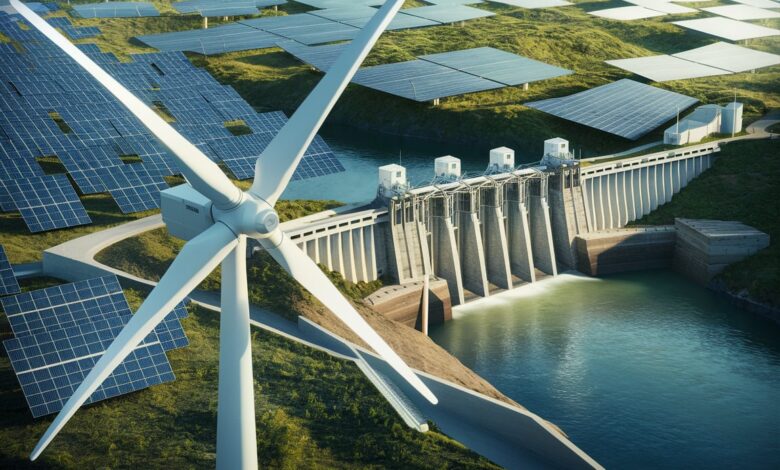Innovative Solutions in Renewable Energy: The Future of Power

Key Takeaways
- Reducing carbon emissions and tackling climate change need the use of renewable energy.
- Innovative solutions like solar power, wind energy, and smart grids are transforming the energy landscape.
- Data-backed evidence shows that renewable energy adoption is growing globally.
- Although there are obstacles to overcome, the advantages significantly outweigh them.
Innovative solutions in renewable energy are shaping the future of power by harnessing solar, wind, and other sustainable sources. These advancements promise increased efficiency, reduced costs, and a smaller environmental footprint, driving the global transition towards cleaner and more reliable energy systems.
The Importance of Renewable Energy
One of the main issues facing humanity now is climate change. The demand for sustainable solutions is more significant than ever as global temperatures increase and catastrophic weather events occur more frequently. Renewable energy is critical in reducing greenhouse gas emissions and ensuring a sustainable future. By leveraging renewable energy systems like solar and wind, we can decrease our reliance on fossil fuels, significantly contributing to air pollution and global warming. This shift helps mitigate the damaging effects of climate change and promotes energy security and economic stability.
Transformative Renewable Energy Solutions
Recent technological advancements have paved the way for innovative renewable energy solutions that are efficient and increasingly affordable. Solar power, wind energy, and smart grids are revolutionizing how we produce and consume energy. Solar panels, for example, have seen significant improvements in efficiency and cost, making them accessible to a broader range of consumers. Wind turbines have also become more advanced, capable of generating higher amounts of electricity even in low-wind conditions. Smart grids are another revolutionary technology that improves the resilience and dependability of power networks by managing and distributing energy more efficiently via digital technologies. These technologies reduce environmental impact and promise greater efficiency and reliability, setting the stage for a sustainable energy future.
Solar Power: Harnessing the Sun’s Energy
Solar power is considered one of the most hopeful renewable energy sources due to its widespread availability and abundance. The efficiency and affordability of photovoltaic (PV) panels are increasing, allowing for their widespread adoption in both the home and commercial sectors. For example, during the last ten years, solar panel prices have decreased dramatically, making solar energy more affordable for homes and businesses than ever before. The effectiveness of solar installations is further increased by innovations like solar tracking systems, which track the sun’s path throughout the day, and bifacial modules, which collect sunlight from both sides of the panel. Furthermore, the intermittent nature of solar electricity is addressed by developments in energy storage technologies like lithium-ion batteries, which store extra energy at night or on cloudy days, making solar energy a more dependable energy source.
Wind Energy: Capturing Nature’s Power
Within the renewable energy landscape, wind energy is another rapidly expanding sector. Modern wind turbines can generate substantial amounts of electricity thanks to turbine technology and design advancements. Recent statistics state that the capacity of wind power has doubled over the last five years, solidifying its place in the world’s energy mix. Offshore wind farms are promising; they can utilize the more robust and reliable winds that blow across the ocean. These installations are less intrusive to human populations and can generate large amounts of power without taking up valuable land space. Furthermore, newer turbine models are equipped with sensors and predictive maintenance systems that optimize performance and reduce downtime, ensuring that wind energy remains a reliable and cost-effective option for power generation.
Overcoming Challenges in Renewable Energy
Adopting renewable energy has certain obstacles which need to be addressed despite its many advantages. High initial costs, intermittent energy supply, and the need for advanced storage solutions are some of the primary obstacles. However, continuous research and development are making significant strides in overcoming these barriers. Innovations in financing models, such as power purchase agreements (PPAs) and community solar programs, are helping to lower the financial entry barriers for individuals and organizations by storing excess power for use during times of low output—energy storage technologies like as flow and solid-state batteries are enhancing the reliability of renewable energy sources. Moreover, innovative grid technology improves the ability to efficiently manage and distribute renewable energy, reducing wastage and ensuring a stable supply. These developments make renewable energy more reliable, cost-effective, and accessible to a broader audience.
Global Adoption Trends
Countries worldwide are increasingly adopting renewable energy as part of their strategies to combat climate change and promote sustainable development. Initiatives and policies supporting clean energy are being implemented globally, facilitating the transition to a greener future. For example, many nations have set ambitious targets to reach net-zero emissions by mid-century, accelerating renewable energy adoption. In Europe, the European Green Deal aims to make the continent climate-neutral by 2050, strongly emphasizing renewable energy deployment. Similarly, Asian and American countries invest heavily in renewable energy infrastructure and incentives to attract private sector participation. These efforts are reflected in the growing installation of wind farms, solar arrays, and other renewable energy projects worldwide, demonstrating a collective commitment to a sustainable energy future.
Future Outlook of Renewable Energy
The future of renewable energy is bright and holds immense potential for transformative impact. Global power networks are expected to rely heavily on renewable energy as economies of scale and technological advancements drive down costs. Continued investment and innovation will be critical to unlocking its full potential. Governments, private sector players, and communities must work together to create an enabling environment for renewable energy, including supportive policies, financial incentives, and public awareness campaigns. Renewable energy solutions will be crucial in meeting global energy demands and safeguarding the environment for future generations as we transition to a more sustainable future. Moving towards a renewable energy future offers more than just an environmental necessity; it also presents an economic chance with the potential for creating jobs, ensuring energy security, and improving quality of life.
Conclusion
Renewable energy solutions offer a viable path to a sustainable and environmentally friendly power future. By embracing these innovative technologies, we can reduce our carbon footprint and build a resilient energy system for future generations. Although many obstacles exist to a future powered by renewable energy, the advantages outweigh them. With coordinated efforts from all stakeholders, we can transition to a cleaner, greener, and more sustainable world.





